The history and future of Japan's cooperation in the Tuberculosis Control Program in the Philippines -Aiming for human resource development of leaders playing on a global stage
2022.04.19
The National Tuberculosis Reference Laboratory established with Japan's grant aid celebrated the 20th anniversary of its founding on March 20th, 2022. The Philippines, which used to be a recipient country in the TB control program, is now developing human resources to be able to contribute to the world's TB control program with their knowledge and skills. We will look back at the TB control program in the Philippines and Japan's cooperation to support it.
The Philippines classified as a high TB burden country by WHO has been focusing on the TB control program over the years.
The National Tuberculosis Reference Laboratory (Hereafter called "NTRL") in the Philippines housed under the Research Institute for Tropical Medicine was established with Japan's grant aid as the research institution for the National TB control program to achieve a TB-free Philippines on March 20th, 2002.
NTRL plays a vital and major role to monitor and manage the operation of the TB laboratory network in the Philippines as the laboratory arm of the Department of Health in TB testing. Furthermore, NTRL has been conducting globally competitive research, providing high quality laboratory services to protect people in the Philippines from TB, and developing human resources for TB control programs.
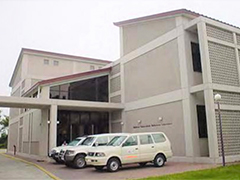
The National Tuberculosis Reference Laboratory established with Japan's grant aid
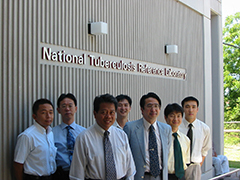
Commemorative photo at the opening ceremony (Provided by RIT, JATA)
In Philippines as the Public Health Development Project (1992-1997) and the Tuberculosis Control Project (1997-2002) were implemented with Japan's technical cooperation since 1992, to strengthen the TB control program focusing on improvement of capability to do DOTS (Directly Observed Treatment, Short-Course: treatment directly watching patients taking their medication and so on, the WHO-recommended TB control strategy), TB cure rate has improved in almost all the targeted areas.
After the establishment of NTRL, the Project for Quality Tuberculosis Control (2002-2007) was implemented to enhancement of DOTS and this strategy has made clinical laboratories and the field more recognizable to people. . The Quality Assurance of smear examination and the establishment of the TB laboratory network to improve the test quality have attracted attention from all over the world.
Staff of the Research Institute of Tuberculosis, Japan Anti-Tuberculosis Association (Hereafter called "RIT") which has implemented various activities to control TB at home and abroad for a long period of time got involved in the project as experts.
As TB used to be raging in Japan, it was called "Nation disease". Japan has various knowledge and experience of TB control program as well as a history of efforts to overcome it. Besides JICA's technical cooperation projects, RIT has been implementing technical support for the TB control program and TB diagnostic (Laboratory examination) in the Philippines through joint research and provision of technical advice as WHO short-term consultants and so on since 1992. As a SRL (Supra-national Reference Laboratory: international reference laboratory) for NTRL, RIT has also provided technical assistance to laboratories, including support for national TB prevalence survey as well as national drug resistance survey conducted every several years, and so on. During project period from 1992 to 2007, 5 long-term experts and a total of 50 short-term experts were dispatched from RIT.
RIT also had the RIT/JATA Philippines Inc. from 2007 to 2019. It contributed to the improvement of the TB control program for poor people in Manila.
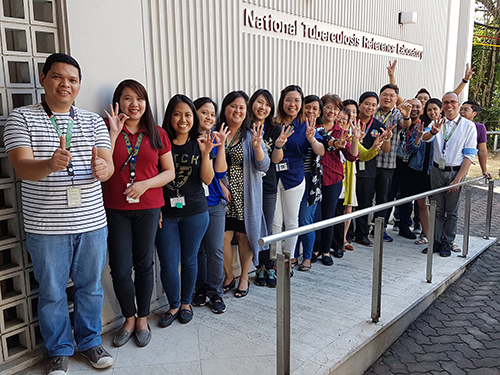
Staff of RIT and NTRL took a commemorative photo (Provided by RIT, JATA)
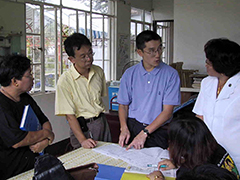
On site evaluation in Bohol Island (2002: Provided by RIT, JATA)
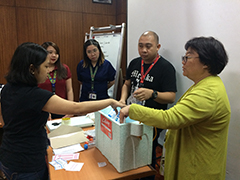
Staff of RIT and NTRL discussing how to transport specimens for national TB prevalence survey (Provided by RIT, JATA)
JICA has implemented several kinds of training courses in cooperation with RIT to achieve a TB-free world such as a course for personnel in charge of TB control program in middle management, a laboratory course for medical doctors in charge of laboratory and laboratory technologists, and an advanced course for senior staff engaged in TB control programs.
Thirteen staff from NTRL participated in the training courses so far since the establishment of NTRL in 2002. As many as 45 participants including staff from NTP (the National TB Control Program) have completed the training. Many of the ex-participants have made significant contributions to the fight against tuberculosis, and some have gone on to become undersecretaries of the Ministry of Health.
Among JICA training courses, the laboratory course which 371 participants from 60 countries participated in in 46 years since 1975 has especially emphasized on TOT (Training of trainers), including the training to develop facilitators. As participants from the Philippines had high level knowledge and technical skills, some ex-participants also participated in the training as facilitators since 2004. 3 out of 5 facilitators from the Philippines are NTRL staff. The three ex-participants cooperated in the training 7 times in total.
As all participants in the laboratory course are fully supported in technical training, exercise, and tutoring, facilitators play significant roles in the training. RIT, the implementing body of the program, said as follows. "One of the objectives of NTRL is to develop staff contributing to the world. We are pleased that NTRL and RIT have established a win-win relationship of cooperation through the training programs."
Ryan V. Castro, the section head of the training unit of NTRL who participated in the training in 2016 said, "NTRL and JICA maintain a strong partnership due to the common goal of improving the health and welfare of the Filipino people. The support being provided by JICA is significant in the attainment of the mission of NTRL. The training opportunities offered by JICA through KCCP training programs tremendously help in the capacity building of our laboratory staff and further enriching their experience through exposure to international training." He participated in the training 3 times as a facilitator, enthusiastically instructing participants from various countries.
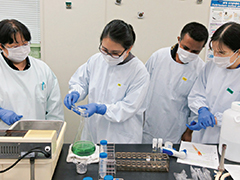
Participants making medium for tests under the guidance of Matsumoto, the course leader
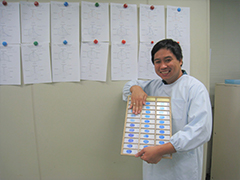
Ryan V. Castro, an ex-participant who is the section head of the training unit of NTRL
Lastly, we interviewed RIT about what they expect NTRL to do in the future.
The message from RIT
NTRL conducted JICA's Third Country Training Program (The training which developing countries implement in transferring, disseminating, and entrenching their superior experiences of development, knowledge, and technologies with support from JICA through accepting participants from other developing countries) twice, inviting participants from neighboring countries in Southeast Asia. We are delighted that NTRL has not only strengthened the TB control program in the Philippines but also developed human resources to support cooperation for neighboring countries. We expect further development of NTRL and mutual cooperation between RIT and NTRL in capacity building of staff and provision of opportunities for them to play their roles.
Ryan V. Castro gave us an encouraging message. "I expect NTRL to be a dynamic department responsive to public health needs through excellence in research, training, control and management of tuberculosis. Our commitment and aspiration for a TB-free Philippines will never cease even in COVID-19 pandemic."
JICA has been committed to controlling TB in the Philippines through grant aid, technical projects, and training programs in collaboration with RIT. It is wonderful that the human resources developed by JICA's cooperation and NTRL itself are now contributing to TB control not only in the Philippines but also in other countries beyond the border. We expect NTRL will continue to contribute to TB control program at home and abroad, and human resources developed by NTRL will play their roles worldwide across the border. We will continue to cooperate with each other to control TB hand in hand in the future.
Cooperation in the article: the Research Institute of Tuberculosis, Japan Anti-Tuberculosis Association and The National Tuberculosis Reference Laboratory
scroll